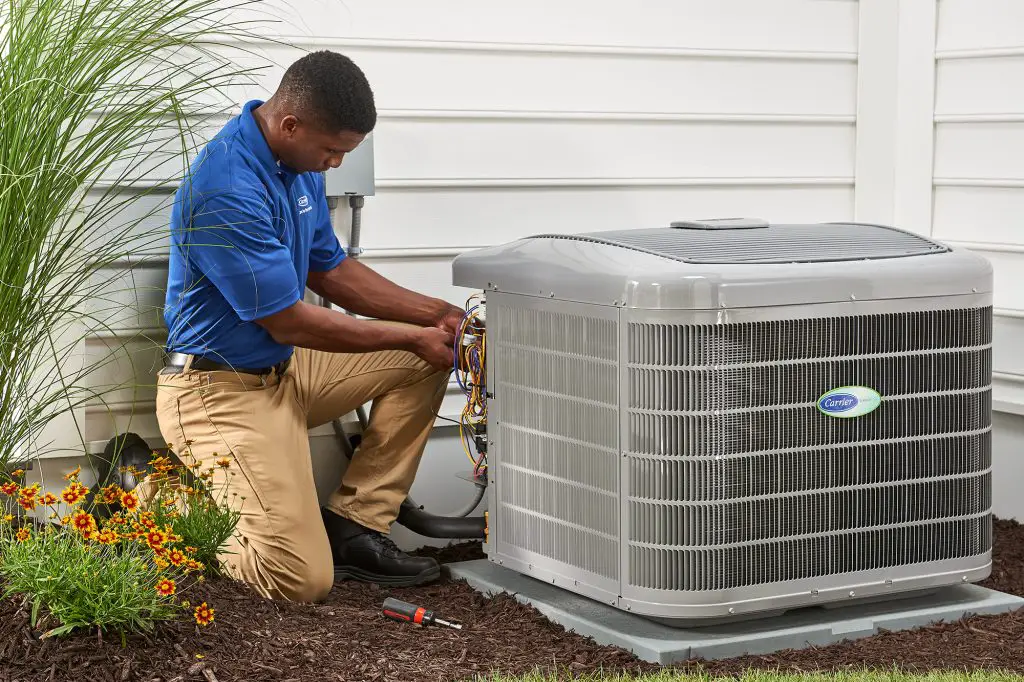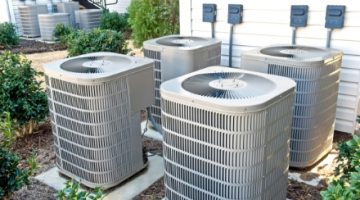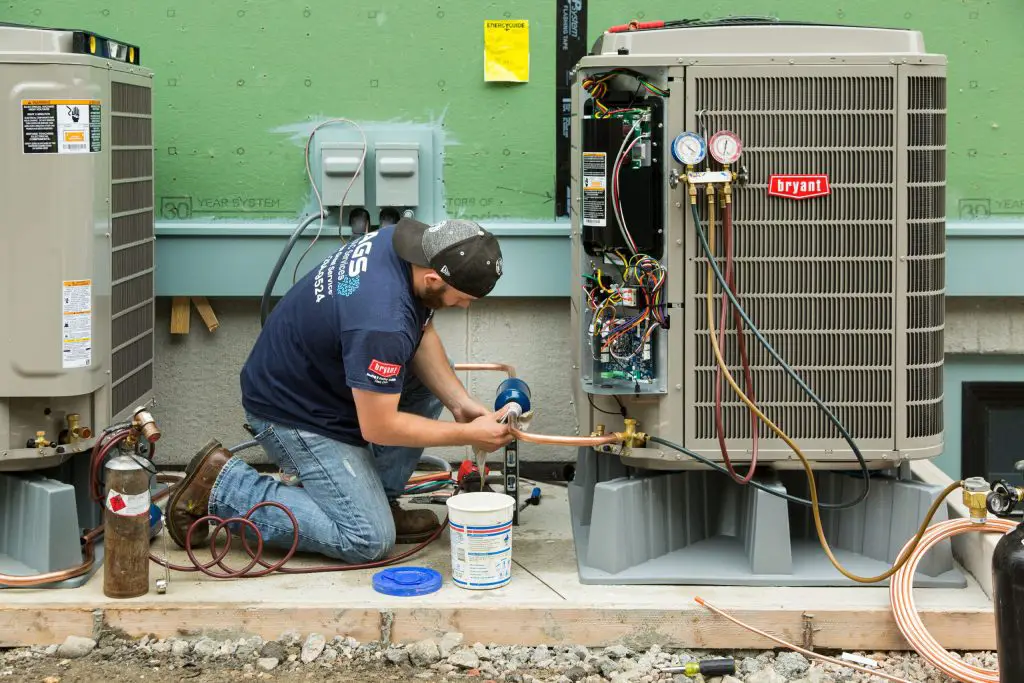The best HVAC air conditioning systems for residential use are those that prioritize energy efficiency, optimal cooling performance, and reliable durability. These systems should have a high Seasonal Energy Efficiency Ratio (SEER) rating, provide effective airflow and temperature control, and come from reputable brands known for their quality and longevity.
Some top-rated options in the market include brands like Carrier, Trane, Lennox, and Rheem. These brands offer a range of models that cater to different home sizes and climate conditions, ensuring homeowners can find the ideal solution for their cooling needs.
Overall, the best HVAC air conditioning systems for residential use are those that provide reliable and efficient cooling performance for a comfortable and cost-effective home environment.
Understanding The Different Types Of Hvac Systems
When it comes to choosing the best HVAC air conditioning system for your residential use, it’s important to understand the different types available. Each type has its own set of advantages and considerations to keep in mind. In this post, we’ll explore three popular options: centralized systems, ductless mini-split systems, and window and portable units.
Centralized Systems
Centralized systems are the most common type of HVAC system found in residential homes. These systems consist of one central unit that heats or cools the air, and a network of ducts that distribute the conditioned air throughout the house. The central unit is typically located outside the house, while the ducts are concealed within the walls, floors, or ceilings.
One of the main advantages of centralized systems is their ability to effectively cool or heat an entire house. They can also provide consistent temperature control and are often energy-efficient. However, centralized systems can be costly to install, especially if your home doesn’t already have ductwork in place.
Ductless Mini-split Systems
Ductless mini-split systems are becoming increasingly popular for residential use. As the name suggests, these systems do not require ductwork for distribution. Instead, they consist of one or more indoor units that are mounted on walls or ceilings, and a small outdoor unit that houses the compressor and condenser. The indoor and outdoor units are connected via refrigerant lines.
One of the main advantages of ductless mini-split systems is their flexibility. Each indoor unit can be independently controlled, allowing for zoned temperature control and energy savings. They are also relatively easy to install compared to centralized systems, as they don’t require extensive ductwork. However, ductless mini-split systems may not be suitable for larger homes or buildings with multiple rooms.
Window And Portable Units
Window and portable units are the most portable and affordable option among HVAC systems. These units are designed to cool or heat a single room or small area. Window units are installed in a window opening, while portable units can be moved from one room to another.
One of the main advantages of window and portable units is their affordability and ease of installation. They are also ideal for smaller spaces or for individuals who rent or move frequently. However, these units are not as powerful as centralized or ductless systems, and they may not offer the same level of temperature control or energy efficiency.
Understanding the different types of HVAC systems available for residential use is essential when it comes to choosing the best option for your home. Whether you opt for a centralized system, a ductless mini-split system, or a window or portable unit, consider your specific needs, budget, and the size of your space. Each type has its own set of advantages and considerations, so it’s important to weigh them carefully before making a decision.

Factors To Consider When Choosing An HVAC Air Conditioning System
Choosing the best HVAC air conditioning system for residential use requires careful consideration of factors like energy efficiency, size, and cost. It’s crucial to assess the specific cooling needs of your home and find a system that meets those requirements efficiently and effectively.
Factors to Consider When Choosing an HVAC Air Conditioning System
When it comes to selecting the best HVAC air conditioning system for your home, there are several crucial factors to consider. From cooling capacity to energy efficiency and indoor air quality, each aspect plays a vital role in ensuring your comfort and well-being. In this article, we will explore these factors in detail, providing you with the information you need to make an informed decision.
Cooling Capacity and Efficiency Ratings
The cooling capacity of an HVAC air conditioning system is directly related to its ability to effectively cool your home. It is measured in British Thermal Units (BTUs) and refers to the amount of heat that the system can remove from the air in an hour. Determining the appropriate cooling capacity for your home involves considering factors such as square footage, insulation, ceiling height, and windows.
In addition to cooling capacity, efficiency ratings are equally important when choosing an HVAC air conditioning system. Efficient systems not only provide optimal cooling performance but also help you save on energy costs. The efficiency of an air conditioning system is measured by its Seasonal Energy Efficiency Ratio (SEER) rating. A higher SEER rating indicates greater energy efficiency and lower operating costs.
Energy Efficiency and Operating Costs
Energy efficiency is a crucial aspect to consider when selecting an HVAC air conditioning system. An energy-efficient system not only helps reduce your carbon footprint but also saves you money on monthly utility bills. High-efficiency air conditioners utilize advanced technology to maximize cooling performance while minimizing energy consumption. Additionally, these systems often qualify for energy-saving incentives and rebates.
To assess the operating costs of an HVAC system, it is important to consider not just the initial purchase price but also the long-term expenses. A system with a higher SEER rating may have a higher upfront cost, but its energy-saving benefits can offset the initial investment over time. It is essential to weigh the initial cost against the potential long-term savings to make an informed decision.
Indoor Air Quality and Filtration Features
Indoor air quality is a critical factor to consider when choosing an HVAC air conditioning system. A system with advanced filtration features can significantly improve the air quality in your home, reducing allergens, dust, and pollutants. Look for systems that incorporate high-efficiency air filters, UV germicidal lights, and air purifiers to enhance indoor air quality.
Additionally, consider the ventilation capabilities of the HVAC system. Proper ventilation ensures that fresh air is circulated throughout your home, preventing the accumulation of stale air and promoting a healthier living environment. Systems that offer variable speed fans and humidity control features can further optimize indoor air quality and provide a comfortable living space.
In conclusion, when selecting an HVAC air conditioning system for your home, it is crucial to consider factors such as cooling capacity, efficiency ratings, energy efficiency, operating costs, and indoor air quality features. By evaluating these elements and finding a system that meets your specific requirements, you can enjoy optimal comfort, energy savings, and improved indoor air quality in your residential space.
Top-rated HVAC Air Conditioning Systems For Residential Use
When it comes to choosing the best HVAC air conditioning system for your residential needs, it’s essential to consider factors such as efficiency, advanced technology, and energy-saving features. To help you make an informed decision, we have compiled a list of the top-rated air conditioning systems available in the market today. These systems offer exceptional performance, comfort, and reliability for your home. Let’s explore the features, benefits, and customer reviews for each of these leading brands.
Brand A: High-efficiency Centralized System
Brand A is a pioneer in the HVAC industry and has gained a reputation for its high-efficiency centralized air conditioning systems. These systems are designed to provide efficient cooling for larger residential spaces. Here are some remarkable features and benefits of Brand A:
- Energy-efficient performance, reducing electricity consumption and utility bills
- Powerful cooling capacity to ensure optimal comfort even during hot summer days
- Advanced filtration system that removes airborne pollutants, improving indoor air quality
- Smart thermostat compatibility for enhanced control over temperature settings
Customer reviews for Brand A’s high-efficiency centralized system have been overwhelmingly positive. Users praise the system’s cooling performance, energy efficiency, and quiet operation. The exceptional reliability of the system has also been highlighted by many customers.
Brand B: Ductless Mini-split System With Advanced Technology
For homeowners who prefer a more flexible and versatile air conditioning solution, Brand B offers a range of ductless mini-split systems with advanced technology. These systems are ideal for smaller residential spaces or rooms that do not have existing ductwork. Here are some notable features and benefits of Brand B:
- Easy installation without the need for ductwork, making it a cost-effective option
- Zoning capability, allowing for customized temperature control in different areas of the home
- Quiet operation and sleek design, blending seamlessly with modern home interiors
- Smart technology integration for remote control and monitoring through mobile devices
Customer reviews for Brand B’s ductless mini-split systems have been highly positive. Users appreciate the compact design, easy installation process, and the ability to control temperature settings for different zones. The quiet performance and energy efficiency of the system have also received praise from customers.
Brand C: Window And Portable Units With Energy-saving Features
If you are looking for a more portable and budget-friendly option, Brand C offers a range of window and portable air conditioning units with energy-saving features. These units are perfect for smaller residential spaces or for those who require cooling in specific areas of the home. Here are some notable features and benefits of Brand C:
- Easy installation and portability, allowing for flexibility in cooling specific areas
- Energy-saving modes and programmable timers for efficient operation and reduced energy consumption
- Quiet operation for undisturbed sleep and relaxation
- User-friendly controls and LCD displays for convenient operation
Customer reviews for Brand C’s window and portable units have been overwhelmingly positive. Users appreciate the ease of installation and the portability of these units. The energy-saving features and quiet operation are also highly valued by customers.

Considerations For Installation And Maintenance
When it comes to choosing the best HVAC air conditioning system for your residential use, it is not only important to consider the performance and efficiency of the system but also how it will be installed and maintained. Proper installation and regular maintenance are crucial for the longevity and optimal functionality of your HVAC system. In this section, we will delve into two important considerations: professional installation vs. DIY installation and regular maintenance and cleaning tips for HVAC systems.
Professional Installation Vs. Diy Installation
Installing an HVAC system is a complex task that requires technical expertise and knowledge. While some homeowners may consider a DIY installation to save money, it is essential to understand the potential risks and drawbacks of taking on this project without professional assistance.
- Expertise: HVAC professionals have extensive knowledge and experience in installing different types of systems. They understand the intricacies involved in HVAC installations and can ensure that everything is properly connected and functioning.
- Warranty: Many HVAC manufacturers require professional installation to preserve the warranty. Attempting a DIY installation may void the warranty, leaving you responsible for any future repairs or replacements.
- Safety: HVAC systems involve electrical connections and refrigerants that can be hazardous if mishandled. Professionals are trained to handle these elements safely, reducing the risk of accidents or injuries during the installation process.
- Efficiency: Proper installation is crucial for achieving optimal efficiency from your HVAC system. HVAC professionals can assess your home’s specific needs and ensure that the system is sized, positioned, and calibrated correctly for efficient operation.
If you are considering a DIY installation, it is essential to weigh the risks and challenges. Improper installation can lead to reduced performance, higher energy consumption, and a shorter lifespan for your HVAC system. It is always advisable to consult with a professional HVAC technician before embarking on a DIY installation.
Regular Maintenance And Cleaning Tips For Hvac Systems
Maintaining your HVAC system is essential for its long-term performance and durability. Regular maintenance helps prevent breakdowns, improves energy efficiency, and ensures clean and healthy air circulation throughout your home. Here are some tips to keep your HVAC system in top shape:
- Change air filters regularly: Dirty air filters can restrict airflow and reduce the efficiency of your HVAC system. It is recommended to change the filters every 1-3 months or as recommended by the manufacturer.
- Clean the outdoor unit: The outdoor unit of your HVAC system can accumulate dirt, debris, and vegetation. Regularly clean the unit using a hose to remove any build-up that could obstruct airflow and reduce efficiency.
- Maintain proper clearance: Ensure that your HVAC system has adequate clearance around it to allow for proper airflow. Remove any objects or debris that may obstruct the unit, both indoors and outdoors.
- Check and clean air vents and ducts: Regularly inspect air vents and ducts for dust and debris. Use a vacuum or a damp cloth to clean them, ensuring unobstructed airflow throughout your home.
While regular maintenance is crucial, it is also important to schedule professional HVAC inspections and tune-ups at least once a year. HVAC technicians can identify and address any potential issues, clean critical components, and optimize the performance of your system.

Frequently Asked Questions For What Are The Best Hvac Air Conditioning Systems For Residential Use?
What Are The Top Hvac Air Conditioning Systems For Residential Use?
There are several top HVAC air conditioning systems for residential use, including brands like Daikin, Mitsubishi, and Bryant. These systems offer energy efficiency, advanced features, and reliable cooling performance for residential spaces.
How Do I Choose The Right Hvac Air Conditioning System For My Home?
When choosing an HVAC air conditioning system for your home, consider factors like the size of your space, your budget, energy efficiency ratings, and the reputation of the brand. It’s also important to consult with a professional HVAC technician to determine the best system for your specific needs.
Are Ductless Mini-split Systems A Good Option For Residential Cooling?
Yes, ductless mini-split systems are a great option for residential cooling. These systems offer individual climate control for different zones in your home, are energy efficient, and do not require extensive ductwork installation. They are also quieter and provide better air quality compared to traditional HVAC systems.
Conclusion
When it comes to the best HVAC air conditioning systems for residential use, it’s important to consider factors such as energy efficiency, performance, and reliability. By investing in a high-quality system from reputable brands, homeowners can ensure optimal comfort and cost savings in the long run.
Regular maintenance and proper installation also play crucial roles in maximizing the lifespan and efficiency of the system. Ultimately, it’s recommended to consult with HVAC professionals to determine the best system that suits your specific needs and budget.

